|
Mass Spectrometry
The Pandey lab is involved in developing proteomic methods as well in applying mass spectrometry for studying signaling pathways, identifying biomarkers and characterizing protein-protein interactions. The lab is equipped with a number of mass spectrometers including Agilent's 6538 Ultra High Definition Accurate-mass Q-TOF, Thermo's LTQ-Orbitrap XL ETD mass spectrometer and Agilent's 6430 Triple Quadrupole mass spectrometer.
|
|
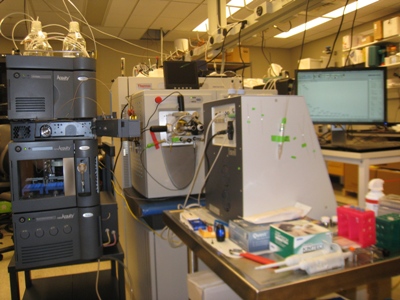 Thermo LTQ Orbitrap Elite ETD mass spectrometer
Thermo LTQ Orbitrap Elite ETD mass spectrometer
We have the LTQ Orbitrap Elite mass spectrometer equipped with ETD on a short term lease in collaboration with Dr. Ted Dawson's laboratory at Johns Hopkins. It is one of Thermo's hybrid Fourier Transform mass spectrometers that combines a linear ion trap mass analyzer with an Orbitrap mass analyzer. In addition to combination of fast scanning linear ion trap and high resolving power and mass accuracy of Orbitrap mass analyzer, this instrument is also equipped with ETD which allows the orthogonal, electron-based peptide/protein fragmentation, resulting in c/z fragment ions. In addition to the conventional CID, the instrument also features a new higher energy collisional dissociation (HCD) cell. We are using this mass spectrometry to study Parkinson's disease.
|
|
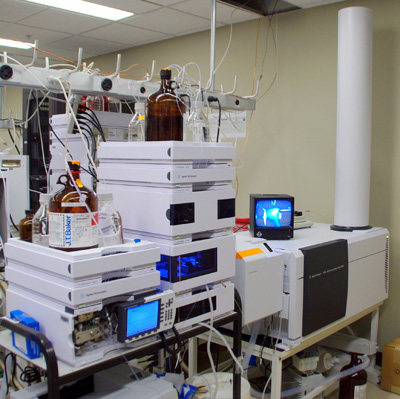 Agilent's 6538 Ultra High Definition Accurate-mass Q-TOF
Agilent's 6538 Ultra High Definition Accurate-mass Q-TOF
This mass spectrometer provides a very
high resolution (40,000), high mass accuracy (parts per
billion) and dynamic
range (four to five orders of magnitude). The sensitivity
of detection for peptides is in attomole range. The variable scan speed mode
offers
dynamic scan speed based on abundance of precursor peptides. Agilent's 6538 Q-
TOF is interfaced with Agilent's HPLC chip-cube nanospray source which offers
great advantage by reducing variation caused by manual intervention. In our laboratory,
we are
using this mass spectrometer for various proteomic applications such as proteogenomics,
quantitative proteomics based on SILAC, iTRAQ, 18O labeling and label-free
approaches and for the analysis of post-translational modification such as acetylation
and
phosphorylation.
|
|
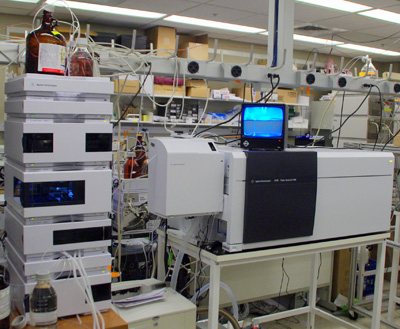 Agilent's 6430 Triple Quadrupole LC/MS
Agilent's 6430 Triple Quadrupole LC/MS
This mass spectrometer is designed for true multiple reaction monitoring (MRM) based
quantitation. The improved hexapole collision cell offers fast monitoring of multiple
peptides with short dwell time enabling one to monitor hundreds to thousands of
transitions in a single run. We are using this mass spectrometer to develop biomarker
assays in serum, urine and tissues for developing MRM assays for early detection of
cancers and other diseases.
|
|
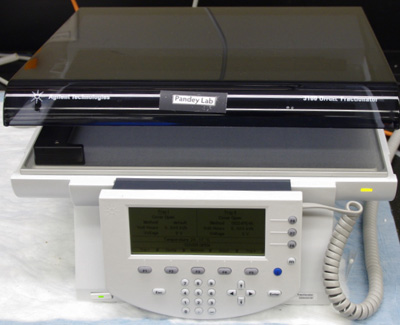 3100 OFFGEL Fractionator
3100 OFFGEL Fractionator
Agilent's 3100 OFFGEL fractionator can be used for in-solution pI based separation. Our lab utilizes this fractionation technique for fractionating proteins as well as peptides to obtain a deeper coverage of the proteome in a number of quantitative proteomics and proteogenomics projects.
|
|
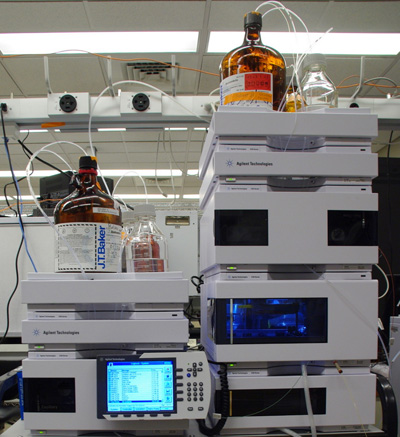 HPLC Systems
HPLC Systems
Our lab has one 1200 series and three 1100 series HPLC systems from Agilent Technologies. We use these LC systems for both nano-flow and standard flow applications. In most projects, we carry out offline fractionation of proteins/peptides using various LC based techniques such as strong cation exchange chromatography (SCX), anion exchange chromatography and macroporous reversed phase chromatography. We also employ multiple affinity removal system for depletion of abundant proteins from serum, urine or other body fluids.
|